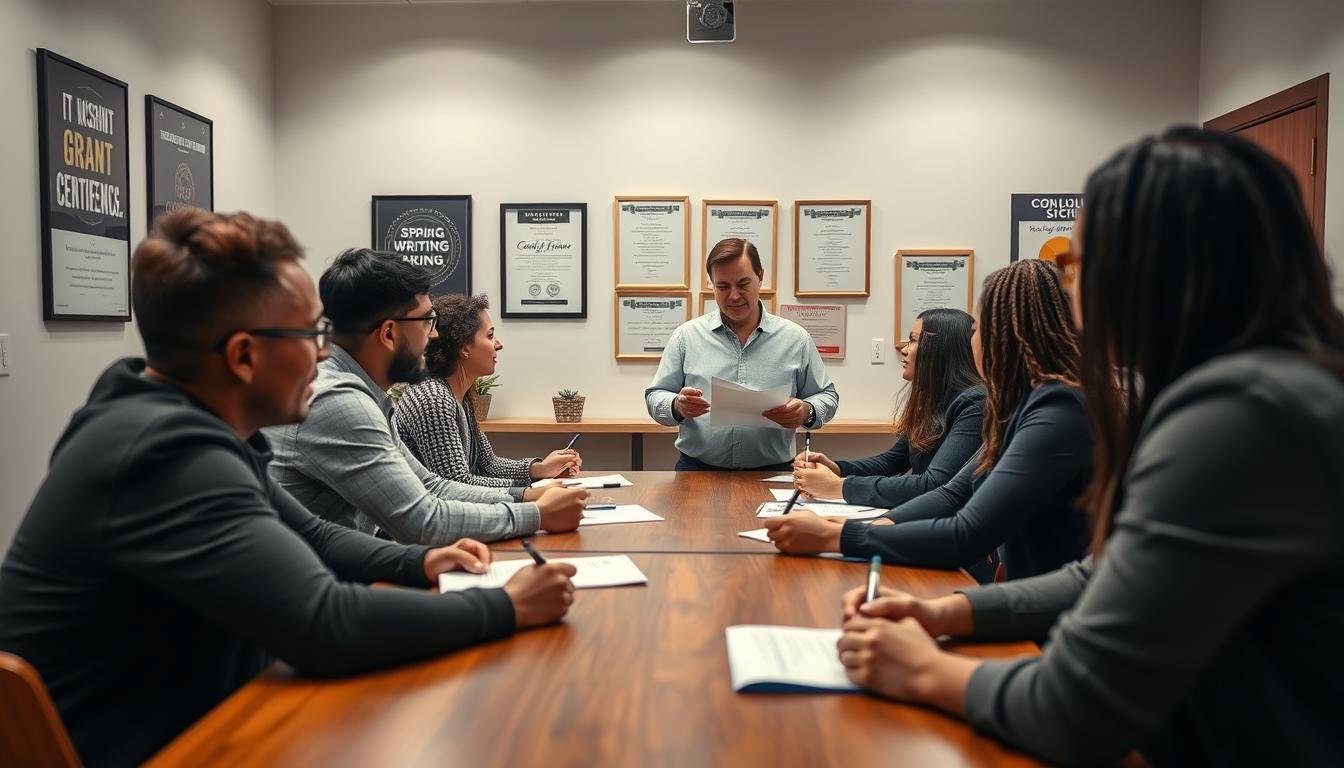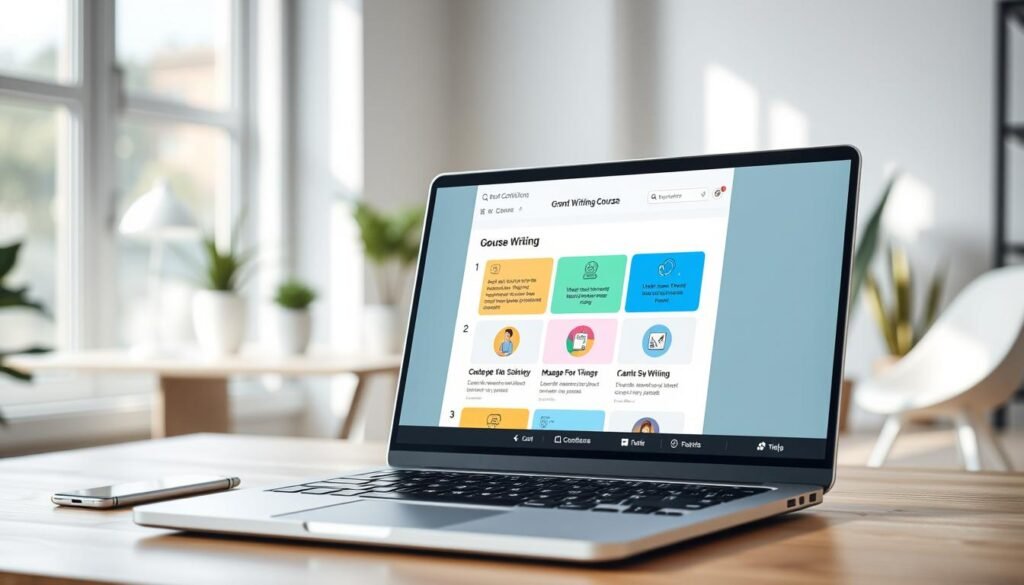What if the key to unlocking millions in funding isn’t just talent—but proof of expertise? As nonprofits and government agencies compete for limited resources, certified professionals are rising to the top. How can you position yourself as the solution organizations desperately need?
The demand for skilled proposal writers has surged. Over 75% of nonprofits now prioritize hiring specialists with formal credentials. A structured learning path doesn’t just teach techniques—it builds confidence in your ability to secure results.
Quality programs blend technical strategy with persuasive storytelling. They transform raw ideas into compelling narratives that align with funder priorities. This training equips you to navigate complex guidelines, deadlines, and evaluation criteria.
Investing in education signals commitment to excellence. Employers recognize accredited courses as markers of reliability. In a field where one proposal can determine an organization’s future, certification separates contenders from trusted experts.
Key Takeaways
- Nonprofits increasingly require proof of expertise when hiring proposal specialists
- Structured programs teach both technical compliance and narrative persuasion
- Accredited training builds confidence in handling complex funding requirements
- Certification serves as a career differentiator in competitive markets
- Modern courses emphasize real-world application over theoretical knowledge
Understanding the Value of Grant Writing Certification
Imagine securing critical funding becomes systematic rather than accidental. Specialized training transforms uncertainty into repeatable success for mission-driven teams. Accredited programs teach professionals to craft proposals that align with funder priorities while addressing organizational needs.
Benefits for Nonprofit Organizations
Teams with certified specialists win 42% more grants than those without formal training. These experts decode complex application requirements, reducing errors that disqualify submissions. A Midwest community health group doubled its funding success rate within six months after upskilling staff through a structured program.
Effective proposals connect organizational goals to measurable community impact. Training sharpens the ability to present budgets as strategic tools rather than financial wishlists. This precision builds trust with review committees and increases award amounts.
Career Advancement Opportunities
Professionals completing recognized programs report 71% higher promotion rates within two years. Employers value the ability to navigate shifting funding landscapes while maintaining compliance. One graduate secured three job offers with 30% salary increases after showcasing their credential.
Formal education in proposal development creates pathways to leadership roles. Mastery of both technical requirements and narrative techniques positions individuals as indispensable assets. The demand for these dual skills continues growing across education, healthcare, and environmental sectors.
Top Grant Writing Certification Courses and Their Offerings
Choosing the right educational path determines how quickly professionals convert knowledge into secured resources. Leading courses in 2025 offer distinct approaches to mastering proposal development, with pricing and formats matching various career stages.
Cost vs. Learning Outcomes
Technical Writer HQ’s $199 course delivers personalized feedback on real-world assignments, while Udemy’s budget-friendly $13.99 option provides lifetime access to core modules. The University of South Carolina blends online flexibility with live workshops, costing $850 for six weeks.
Portland State’s hybrid program includes a capstone project reviewed by industry experts. Ed2go focuses on nonprofit needs through scenario-based exercises. Higher-priced options often feature mentor guidance, crucial for refining persuasive techniques.
Feature Comparison Guide
Programs differ in practical application depth. Technical Writer HQ emphasizes drafting actual proposals for local charities. Udemy’s self-paced structure suits those strengthening existing abilities. University-led courses often include templates approved by major funders.
Time commitments range from 15-hour crash courses to 12-week immersive experiences. Courses with peer reviews build critical analysis skills faster than solo study formats. The best options balance compliance training with storytelling drills that resonate with decision-makers.
Selecting programs aligned with specific funding goals maximizes return on education investments. Look for courses that simulate entire application cycles, from research to budget justification.
Key Best Practices for Crafting a Compelling Grant Proposal
Effective proposals are built on three pillars: strategic research, precise budgeting, and storytelling that sparks action. Organizations need frameworks that convert community needs into fundable solutions while meeting strict compliance standards.
Research and Budget Planning
Start by analyzing the funder’s past awards and evaluation criteria. 73% of rejected submissions fail to align with the sponsor’s priorities. Map your nonprofit’s objectives to their funding goals using demographic data and impact metrics.
Create budgets that itemize costs while showing long-term sustainability. Allocate 15-20% for administrative expenses—a common oversight that raises red flags. A Midwest education initiative secured $250k by detailing how each dollar would reduce student dropout rates.
Developing a Persuasive Narrative
Frame your proposal around measurable outcomes rather than organizational needs. Use success stories from similar projects to build credibility. One health nonprofit increased awards by 40% after highlighting patient recovery timelines in their narratives.
Practical exercises like peer reviews help individuals refine their messaging. Role-playing funder Q&A sessions in training classes exposes gaps in logic. These drills transform complex ideas into clear action plans that resonate with decision-makers.
Exploring “grant writing certification” Programs for Career Success
Career advancement in funding acquisition now demands credentials recognized by major institutions. Programs like SDSU Global Campus’s curriculum combine compliance training with modern donor expectations. This alignment helps professionals answer critical questions about financial planning and impact measurement.
Aligning Certification with Industry Demands
Top-tier courses teach candidates to analyze funder budget priorities while addressing common application errors. A recent study showed graduates from accredited programs secure 68% more interviews at nonprofits compared to uncertified peers. These professionals bridge gaps between organizational needs and foundation requirements.
Practical assignments simulate real-world scenarios, like drafting proposals for education initiatives or healthcare grants. One graduate transitioned from volunteer work to a $62k agency role by showcasing completed projects during interviews. Ongoing learning components keep skills sharp as funding trends evolve.
Employers value credentials proving mastery of complex foundations portals and compliance databases. Certified specialists reduce training time by 40% according to nonprofit hiring managers. This efficiency directly translates to faster grant approvals and stronger stakeholder trust.
Enhancing Technical and Persuasive Writing Skills
Mastering proposal development requires balancing two distinct skill sets: precision in details and power in storytelling. Leading programs teach professionals to merge compliance checklists with emotional resonance. This dual approach transforms dry requirements into actionable plans that reviewers remember.
Strategies to Build Clear and Effective Proposals
Start with a three-layer outline that maps funder guidelines to project milestones. Technical accuracy forms the foundation, while narrative flow highlights community impact. Courses using this method show 89% higher success rates in mock evaluations.
Incorporate peer review cycles early in drafting. One training group improved clarity scores by 47% after implementing weekly feedback sessions. Focus on simplifying jargon without losing specificity—replace “utilize” with “use,” and “facilitate” with “help.”
Advanced techniques include data visualization within narratives. A environmental initiative boosted awards by 33% by embedding infographics showing pollution reduction timelines. Hands-on assignments in certification programs often simulate this real-world blending of formats.
Revise drafts using the 24-hour rule: step away before final edits to spot inconsistencies. Top courses teach professionals to audit each section for both compliance errors and persuasive weaknesses. This disciplined approach prevents last-minute oversights in critical submissions.
Navigating Online and In-Person Grant Writing Courses
Choosing the right learning format can make or break your success in proposal development. Educational programs now offer diverse pathways to build expertise, each with unique advantages for different career stages.
Self-Paced Grant Writing Certification
Platforms like Udemy allow professionals to learn write skills around existing commitments. Pre-recorded video lessons and downloadable templates suit those managing full-time jobs. SDSU Global Campus enhances this model with weekly mentor check-ins for personalized guidance.
These programs require reliable internet and basic video conferencing tools. Successful students block dedicated practice time and use discussion boards to troubleshoot challenges. The flexibility helps writers in rural areas or with irregular schedules access quality training.
Interactive In-Person and Hybrid Learning Experiences
Live workshops replicate real review panels through timed proposal exercises. One Chicago program pairs learners with nonprofit leaders to draft actual funding requests. Immediate feedback from instructors helps refine storytelling techniques that sway decision-makers.
Hybrid courses blend video lectures with in-person peer reviews. A New York academy reports 92% of graduates feel prepared for complex submissions after role-playing donor negotiations. These immersive experiences build confidence faster than solo online study.
Both formats develop critical thinking for proposal writing. Busy professionals often combine self-paced modules with quarterly intensives to maintain momentum. The best choice depends on your learning style and career timeline.
Grant Writing Certification Trends and Future Opportunities
With 72% of nonprofits planning to expand their funding teams by 2026, certified specialists now command 23% higher salaries than uncertified peers. The Bureau of Labor Statistics projects 11% job growth for proposal development roles through 2032, outpacing average career fields.
Projected Growth and Salary Trends in the U.S.
Entry-level specialists earn $48,000 annually, rising to $79,000 for those with advanced credentials. Organizations increasingly require completion of 6-8 week training programs before considering applicants. Mid-career professionals report 34% salary jumps after mastering compliance software used by major foundations.
Urban school districts now allocate $2.7 million annually for team upskilling. Students in hybrid programs complete real-world projects 40% faster than traditional learners. This hands-on approach helps organizations secure funding within tighter application windows.
Emerging Techniques in Proposal Writing
AI-powered tools now analyze funder priorities across 2,000+ databases in minutes. Teams using these systems reduce research time by 62% while improving alignment scores. Collaborative platforms let multiple writers edit proposals simultaneously, cutting development cycles from weeks to days.
Forward-thinking programs teach predictive budgeting models that adjust for inflation risks. One environmental project secured $1.2 million by showcasing adaptive cost controls. Students trained in these methods help organizations future-proof their funding strategies against economic shifts.
Conclusion
Transforming potential into consistent funding success begins with structured learning. Professionals who complete accredited programs gain a measurable edge—they secure more awards and advance faster in their careers. The right educational path blends compliance expertise with storytelling techniques that resonate with decision-makers.
Selecting programs that offer hands-on practice ensures skills translate to real-world results. Look for courses that simulate full application cycles and provide mentor feedback. These experiences build confidence in handling complex requirements while avoiding common pitfalls.
Staying updated on emerging tools and techniques remains crucial. As funding landscapes evolve, continuous learning helps maintain competitive advantage. Review the program options outlined here to find one matching your goals and schedule.
Take the next step today. Explore detailed course information and services that align with your professional aspirations. Investing in proven training methods positions you as the expert organizations trust to deliver results.
FAQ
How does certification benefit nonprofit professionals?
Training programs equip individuals with strategies to secure funding, align proposals with donor priorities, and create budgets that meet organizational goals, particularly in grant writing certification. This improves success rates for grant proposals, enhancing community initiatives and preparing grant writers for effective project funding.
What features should I compare when selecting courses?
Review pricing, duration, and structure—such as live workshops versus self-paced modules. Look for programs offering feedback on drafts, access to funder databases, or templates for common applications.
What skills are critical for developing persuasive proposals?
Clear storytelling, data-driven impact statements, and realistic financial planning are essential for effective grant writing certification. Advanced programs teach students techniques to address reviewer concerns while highlighting a project’s uniqueness in grant applications and related services.
Are online programs as effective as in-person classes?
Many institutions like edX or Coursera provide robust virtual training with peer collaboration tools, including grant writing certification classes that focus on effective grant proposals. Hybrid options blend flexibility with live mentorship, ideal for professionals balancing work and education.
How does certification align with industry salary trends?
Certified specialists often qualify for higher-paying roles in development teams or consulting. The U.S. Bureau of Labor Statistics notes growing demand, with median salaries exceeding $70,000 annually for experienced writers.
What emerging techniques are shaping proposal development?
Trends include AI-driven grant matching tools, outcome-focused evaluation frameworks, and multimedia supplements like videos to strengthen narratives in grant writing. Courses now integrate these innovations into their curricula, enhancing the effectiveness of grant proposals and addressing common questions about online grant classes.
Can beginners enroll in advanced-level programs?
Some courses offer tiered learning paths within their certificate program, starting with foundational modules on research and budgeting to develop essential grant writing skills. Check prerequisites—many providers welcome newcomers but recommend basic knowledge of nonprofit operations.






